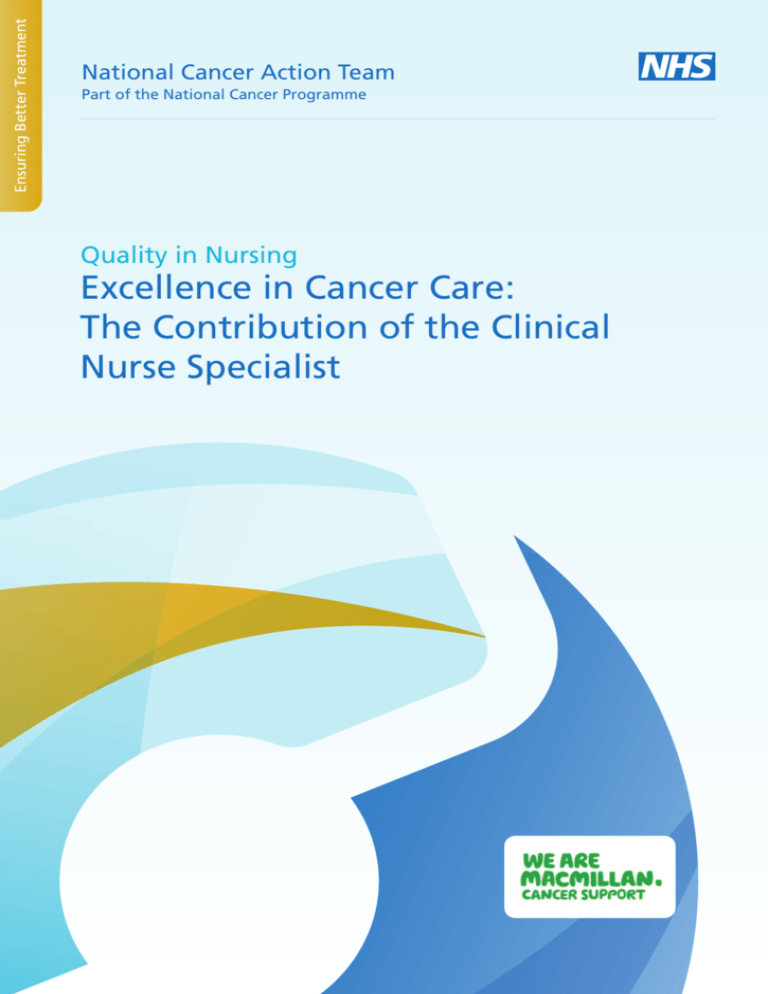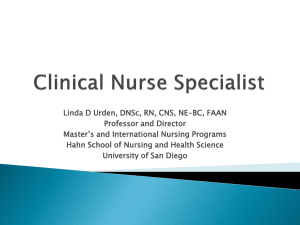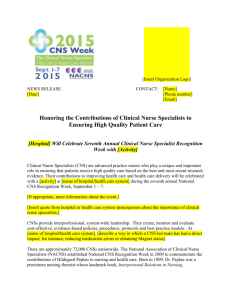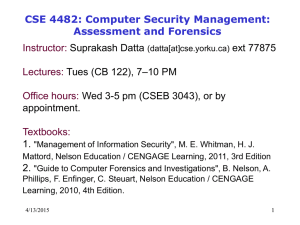
Ensuring Better Treatment
National Cancer Action Team
Part of the National Cancer Programme
Quality in Nursing
Excellence in Cancer Care:
The Contribution of the Clinical
Nurse Specialist
Contents
Foreword
3
The role of the Clinical Nurse Specialist in cancer care
4
Key contributions that CNSs make to cancer care
5
The cost of managing cancer
5
Reducing the financial burden of cancer – the potential of the CNS
6
CNSs: leading quality and productivity in cancer care
6
Experience from the front line – CNSs transforming cancer care
7
Case Studies
8
Delivering the future for cancer patients
11
Matching workforce planning to patient need
11
Issues for Employers and Managers to consider
12
Further sources of information
13
Acknowledgments
13
References
14
Endorsements
15
2
2
Foreword
Together we share an ambition to achieve
the best cancer outcomes for patients in the
UK, recognising that, at a time of tightened
budgets, it is critical that NHS resources are
deployed to best effect. Now more than
ever, clinical nurse specialists (CNSs) have a
vital role to play in delivering high quality
and compassionate care, including care
closer to home, and supporting a drive for
efficiency that improves health outcomes
and maximises resources.
Cancer CNSs have played an important role
in the successful implementation of
initiatives to improve NHS cancer services.
Despite an increasing incidence of the
disease and an ageing population, death
rates from many cancers are dropping,
survival rates are improving and many
patients’ experiences of care have been
enhanced. CNSs are at the front line of
cancer care; they are the main point of
contact for patients and as a result help to
shape services for each patient according to
need and patient choice, which contributes
to wider cancer priorities. For example,
CNSs play an important role in enabling
care to be delivered closer to home and in
improving patients’ and their families’
ability to self-manage symptoms and sideeffects of treatment.
CNSs contribute to increasing the quality of
care provided by the NHS; indeed, in the
face of rising patient expectations, more
patients report being treated with dignity
and respect and having trust and
confidence in their care team. Increasingly,
they have an ongoing role in supporting
cancer survivors as well as cancer patients.
Overall it is estimated that there are now 2
million people living with cancer and this is
set to rise to 4 million by 2030.1
essential to maintain
quality of life. People
whose care is
unplanned and uncoordinated are more
likely to be high users
of health and social
care services,
including emergency
care. CNSs work closely with patients and
with their clinical colleagues to adapt to
patients’ emerging needs thus reducing the
need for unplanned care.
This short guide is designed to support
clinical teams, commissioners, employers
and managers to understand and evaluate
the contribution of CNSs in cancer as they
plan their local workforce and service
improvement strategies. With examples
drawn from front-line services across a
range of cancers, this guide sets out how
effective CNS deployment drives innovation,
reduces inefficiency and improves the
quality of cancer care across the UK.
We still have further to go if we are to
improve outcomes for all cancers, with the
aim of bringing us in line with the best in
Europe. Ensuring provision of CNSs where
they are needed, coupled with effective use
of their skills and expertise will enable us to
move faster towards this goal.
Professor Sir Mike Richards
National Cancer Director
Ciarán Devane
Chief Executive
Macmillan Cancer Support
Dame Christine Beasley DBE
Chief Nursing Officer (England)
Department of Health
For people affected by cancer, the effective
management of their care pathway is
3
3
The role of the Clinical Nurse
Specialist in cancer care
The roles undertaken by Clinical Nurse
Specialists (CNSs) are many and varied;
however, there are core clinical practice
functions and a level of practice that could
be reasonably expected of all CNSs in cancer
care.
CNSs in cancer care can be described as
registered nurses, who have graduate level
nursing preparation and who would usually
be expected to be prepared at Master’s
level. They are clinical experts in evidencebased nursing practice within a specialty
area. The specialty may be focused on a
population (e.g. young people), type of
care (e.g. palliative care), type of problem
(e.g. lymphoedema), type of treatment (e.g.
chemotherapy) or tumour type (e.g. lung
cancer).
CNSs treat and manage the health concerns
of patients and work to promote health
and wellbeing in the patients they care for.
CNSs in cancer care practice autonomously
and integrate knowledge of cancer and
medical treatments into assessment,
diagnosis, and treatment of patients'
problems and concerns.2 Whilst many
specialist nurses may function at an
advanced level, this level of practice is not
common to all, thus the title Clinical Nurse
Specialist does not in itself indicate that the
nurse is an ‘advanced practitioner’.
The high-level activities of CNSs can be
separated into four main functions.3 In the
context of cancer care these consist of:
1 Using and applying technical knowledge
of cancer and treatment to oversee and
coordinate services, personalise ‘the
cancer pathway’ for individual patients
2
4
and to meet the complex information
and support needs of patients and their
families
2 Acting as the key accessible professional
for the multidisciplinary team,
undertaking proactive case management
and using clinical acumen to reduce the
risk to patients from disease or
treatments
3 Using empathy, knowledge and
experience to assess and alleviate the
psychosocial suffering of cancer including
referring to other agencies or disciplines
as appropriate
4 Using technical knowledge and insight
from patient experience to lead service
redesign in order to implement
improvements and make services
responsive to patient need
Furthermore, some cancer CNSs have
developed their roles to include technical
elements, for example: physical
examinations and diagnostic tests; and
insertion of central venous lines for the
delivery of chemotherapy or for nutritional
purposes.
Many cancer CNSs work as part of a tumour
specific team, whereas others may work
across more than one service or setting.
Although many are based within acute
trusts, post-holders are also located in
primary care and community settings or
private and voluntary sector organisations.
They may be responsible for whole client
groups, or for episodes of care and nursing
services more widely. They are also typically
core members of a multidisciplinary team.4
Key contributions that CNSs make to cancer care
Acting as a
key worker
across the
whole care
pathway
Innovation,
project
management
and change
management
Leadership
within
the MDT and
wider cancer
team
Advanced
clinical /
diagnostic
skills
Clinical Nurse
Specialist
In-depth
knowledge
of a tumour
area
Ability to
assess
patients’
holistic needs
Excellent
decisionmaking
abilities
Empathy
for patients
and their
families
Advanced
communication
and advocacy
skills
The cost of managing cancer
The cost to the NHS in England of patient
care for cancer in 2007/8 was £5 billion.5
Department of Health figures for 2007-08
showed that:
• Over half (i.e. over £2 billion) of the total
expenditure on cancer in England went
on inpatient care6
• Inpatient care for cancer patients
accounted for 12% of all inpatient beds
in England6
• The number of emergency admissions for
cancer increased by 47% in the past 8
years6
• 4.7 million bed days were cancer related6
Statistics from 2006-07 for England show:
• 417,646 emergency inpatient admissions
for cancer representing 2,963,987 bed
days6
• 339,038 elective inpatient admissions for
cancer representing 1,750,223 bed days6
3
5
Reducing the financial burden of cancer
– the potential of the CNS
The specialist nature of the cancer CNS and
their role as key worker to individual
patients means that they can quickly
identify emerging issues that might require
medical attention, enabling care to be
planned and emergency admissions averted.
CNSs also support enhanced recovery after
surgery – equipping patients to manage
their recovery at home and reducing the
need for lengthy hospital stays. These two
important contributions help the NHS to
improve patient experience and safety.
There are also sound economic arguments
for supporting patients to manage their
care at home and helping them through the
complex systems of health care provision.
The National Audit Office’s End of Life Care
report estimated £104m savings by reducing
emergency admissions by 10 per cent, and
reducing the length of stay by 3 days.7
An economic modelling analysis by
Macmillan Cancer Support in 20098,
focusing on the role of the CNS, suggested
that service improvements along the cancer
pathway could release about 10% of cancer
expenditure in the Manchester area. This
related only to breast and lung patients
admitted through the two week wait
system in one health economy. If
extrapolated to a national level then the
economic benefits could be significant.
CNSs: leading quality
and productivity in cancer care
• Ensuring people have a positive
experience of care
Patients rightly expect high quality,
effective healthcare and CNSs have an
important role to play in meeting their
needs and expectations.
The proposed NHS Outcomes Framework9 is
structured around five high level outcome
domains. These are intended to cover
everything the NHS is there to do. These
five outcome domains are:
• Preventing people from dying
prematurely
• Enhancing the quality of life for people
with long-term conditions
• Helping people to recover from episodes
of ill health or following injury
2
6
• Treating and caring for people in a safe
environment and protecting them from
avoidable harm
As practitioners and partners at the heart of
multidisciplinary teams, CNSs have influence
and credibility across the care pathway.
They are increasingly taking a leadership
role in refining systems and smoothing care
pathways, making a demonstrable
contribution to effectiveness, patient
experience and safety.
Experience from the front line –
CNSs transforming cancer care
Improving quality and
experience of care
Reinforcing safety
• Managing complex, individual and
changing information and support
needs of patients and carers
• Supporting patients in choices
around treatment and care
• Enhancing recovery and delivering
care flexibly and closer to home
• Facilitating set up of support
groups
• Delivering safe, nurse-led services
• Using vigilance of symptoms and
drug toxicity to trigger rescue work
• Identifying and taking action to
reduce risks
• Facilitating rapid re-entry into acute
services, if appropriate
Impact of key
CNS-led activites
Increasing
productivity and efficiency
• Intervening to manage treatment
side effects and/or symptom control,
preventing unplanned admissions
• Providing nurse-led services that
free up consultant resource
• Empowering patients to selfmanage their condition
CNSs across the country are already
transforming patients’ experiences of
cancer care. The following case studies
provide a flavour of the kinds of initiatives
Demonstrating leadership
• Educating the wider healthcare
team and acting as a mentor
• Identifying and implementing
service improvement and
efficiencies
• Determining measurable outcomes,
auditing practice, and sharing good
practice and innovation
that CNSs are leading – highlighting their
pivotal role in maximising resource and
benefitting patients.
3
7
Case Studies
Innovation, project management, change
management
Lesley Barnett, Macmillan Lead Cancer Nurse, Doncaster
Gina Wibberley, Macmillan Lung CNS, Lincoln
CNSs in Doncaster and Lincolnshire
have implemented rapid alert
systems to ensure that they are
immediately informed when one of
their patients enters hospital with
an unplanned admission. Using
mobile technology and integrated
IT systems, a text message and
email is sent to the CNS who can
immediately attend the patient or
discuss the case with the treating
clinicians.
Using their specialist knowledge in
lung cancer, and their
understanding of individual
patients’ needs, CNSs in
Lincolnshire use this as an
opportunity to re-assess the
patient’s cancer pathway outside of
scheduled patient planning, or
identify where a quick specialist
intervention can turn around an
inappropriate admission. The
nurses in Doncaster have identified
length-of-stay reductions of one to
two days per patient, they work to
ensure that the patient is admitted
to the correct ward and in some
cases prevent admission altogether.
Added to these productivity
benefits is the increased quality of
care experienced by patients who
report feeling completely
supported, knowing that they are
receiving coordinated care.
Empathy for patients and their families
Frances McKay, Macmillan Mesothelioma and Lung CNS, Medway
Frances, and her colleagues
Caroline Williams and Pat
Cameron, run the only lung cancer
and mesothelioma support group
in their Cancer Network. Up to 28
people each month attend the
group.
monthly group meetings with a
hospice volunteer managing the
meeting practicalities. A successful
buddy system has been established
for patients and carers who face
the challenging and complex issues
of a terminal disease.
The CNSs work in collaboration
with a local hospice to facilitate the
The group also enables the CNSs to
identify emerging health issues,
including helping patients to selfmanage symptoms such as
shortness of breath, reducing
anxiety and maintaining quality of
life. Importantly, the CNSs are able
to mediate between patients and
hospital services and quickly
address any issues of concern raised
by patients and their families.
Advanced clinical and diagnostic skills
Sharon McGeary and Amanda Gerrard, Paediatric Oncology Outreach
Network CNSs, Newcastle Upon Tyne
Nurses from
the children’s
oncology
outreach service in Newcastle work
with children and young people
throughout their cancer journeys.
Using specialist knowledge of
symptom management, palliative
and complex care, the nurses work
a 24/7 on-call system, allowing for
timely, effective interventions
which maximise care delivery. The
nurse team are trained as nonmedical prescribers, and more than
half are practising prescribers.
Working in a large geographical
region, the nurses have developed
effective collaborative working
practices with local primary care
service providers. This is particularly
important in enabling children and
young people with progressive
disease to be cared for, and die, in
their preferred place of choice,
often their home.
The nurses are leading the way in
the implementation of new
technologies in their hospital trust.
“Smart Pump” technology,
2
8
considered to be the next
generation of ambulatory infusion
devices, allows the release of
medication over seven days maximising symptom management
and minimising hospital
attendance. Corresponding drug
libraries, managed by the nurses,
help to improve safety by reducing
drug errors, improving workflow
and providing a new source of data
for continuous quality
improvement.
Acting as key worker across the
whole care pathway
Tina Lightfoot, Lead Specialist Nurse for GI services (surgery), Chester
Tina and the
colorectal
specialist nurses provide quality
services to enhance recovery for
patients with colorectal cancer at
the Countess of Chester Hospital.
Through a pre-operative
counselling initiative, patients and
carers have an increased
understanding of recovery and
discharge expectations, helping
them to make plans for managing
care at home. In addition, patients
who are expected to have a stoma
are visited at home by the stoma
nurse for a ‘dummy’ teaching
session, reducing the time it takes
to become self-sufficient in stoma
management.
Patients on the enhanced recovery
programme are discharged as early
as two days after surgery, and
there is evidence that this is
significantly reducing care costs.
The colorectal specialist nurses
contact the patient daily after
discharge for up to 10 days to
assess their progress. This vigilance
ensures that complications are
picked up early enabling timely
intervention, and patients report
feeling supported through their
recovery.
Excellent decision making abilities
Debbie Fitzgerald, Gynaecology CNS, Torbay
Debbie has
developed an
innovative
early-alert
service for women with ovarian
cancer who suffer from a painful
and distressing build up of fluid in
the abdominal area.
Patients are alerted to the
possibility of fluid build-up, and
encouraged to phone her if they
begin to experience symptoms.
When contacted, Debbie makes a
clinical assessment, organising an
abdominal scan if required and
booking blood tests pre-admission.
The drainage can then be done as a
day patient, preventing emergency
admission to A&E and lengthy
inpatient stays as well as improving
patients’ quality of life.
The CNS’s coordinating role ensures
that phlebotomists, radiographers,
and the medical team are all
available at the right time. Debbie
has developed this into a protocol now widely used.
Advanced communication and advocacy skills
Judith Clarke, Surgical Breast Care CNS, Coventry
Judith has developed an innovative
system to monitor and best
manage anxiety among patients
recalled to the breast screening
clinic for further assessment
following attendance to the NHS
breast screening
programme. Judith devised a
simple tool that encourages
patients to reflect on their anxiety
and prompt them to seek
additional support from the breast
care nurse (BCN). It also promotes
greater collaboration with
radiographers and a more
coordinated patient-centred
experience.
Designed to look like a
thermometer, the assessment tool
asks women to score themselves
from 0-10 (low to high anxiety)
enabling BCNs to triage the more
3
9
vulnerable women (scoring 5 and
above) and ensure they are offered
a BCN consultation before being
re-screened. Radiographers also use
the self-assessment to ensure more
patient-focused care, taking into
account women’s concerns.
Feedback from patients shows that
women find this activity useful and
many have commented on how it
helped to reduce their anxiety.
Case Studies (continued)
Demonstrating Leadership
Catherine Oakley, Nurse Consultant, London
Catherine and the team of
chemotherapy nurse specialists at
Guy’s and St Thomas’ Hospital have
been working together to redesign
the way chemotherapy is delivered.
Nurses in the chemotherapy unit
now work in four specialised teams
according to tumour types to
improve consistency for patients
and maximise the nurses’ clinical
expertise.
Catherine piloted an intervention
in urology in which a specialist
nurse and pharmacist delivered an
improved pre-treatment
consultation. The key to its success
is structuring the consultation to
ensure that patients’ educational
and supportive care needs are met
to optimise safety and empower
patients to actively participate in
their treatment plan. Additionally,
CNSs proactively call patients to
monitor their progress during the
course of their treatment. Closely
monitoring patients in this way
ensures that any side-effects can be
quickly managed and that patients
are supported through this
sometimes difficult part of their
cancer journey.
In-depth knowledge of tumour area
Tessa Fitzpatrick, Macmillan Lung CNS, North Tees
Analysis of patient experience at
University Hospital of North Tees
suggests that lung cancer patients
and carers can encounter problems
following admission to the
Emergency Assessment Unit (EAU).
These include unnecessary
investigations, poor symptom
management, lack of recognition
of end of life, delays in discharge
and inadequate communication.
This has a negative impact on
patients’ confidence in the service
and also on the length of stay
which has a cost implication.
The CNSs at North Tees use their
specialist knowledge of lung cancer
to support patients who are
admitted as emergency cases,
reducing inpatient stays and
helping patients and carers to
understand and manage symptoms.
University Hospital of North Tees
examined a total of 94 inpatient
episodes resulting in 964 bed days.
The average length of stay for
those patients not referred to the
lung CNS was 10.8 days however
there was a reduction in length of
stay to 9.7 days for those patients
who had lung CNS input during
their admission.
Ability to assess patients' holistic needs
Anita Pabla, Sarcoma CNS, Leicester
Anita works
with patients
throughout
their cancer
journey but has particularly
focussed on supporting
survivorship and smoothing the
transition from secondary to
primary care.
Six to eight weeks post-treatment,
she provides patients with detailed
and individual ‘end of treatment’
summaries within the context of a
holistic consultation. This captures
their initial diagnosis and
treatment history, medication and
follow-up schedule - incorporating
the wider services they have
accessed, such as limb-fitting and
support groups. The summary also
acts as an important
communication tool for their GP,
2
10
enabling greater integration
between different parts of the
patient pathway.
The summary and assessment has
proved valuable to patients increasing their confidence and
ability to self-manage - as well as
to primary care - improving
appropriate referral if and when
needed.
Delivering the future for cancer patients
The NHS White Paper, Equity and
Excellence: Liberating the NHS, puts
patients and clinicians at the heart of
decision-making in the NHS. The phrase “no
decision about me without me” is used in
the White Paper to emphasise patients’
involvement in their own care.10 CNSs are
often the main point of contact for cancer
patients and their families, and work closely
with colleagues throughout the patient’s
cancer journey. As a result, they are well
placed to support patients at each stage
and to promote integration within care
teams.
Equity and Excellence proposes a shift away
from measuring clinical inputs and
processes in favour of achieving improved
clinical outcomes and higher quality patient
experience. Here too, CNSs already
demonstrate their skills in assessing and
putting in place interventions to achieve
these.
The Cancer Reform Strategy (2007) stated
that: “Commissioners and providers should
ensure that the critical roles of clinical nurse
specialists in information delivery,
communication and coordination of care
are supported”.11 This remains essential to
achieving safe and high quality cancer care
and we expect to see this reflected in the
refreshed Cancer Reform Strategy.
Nursing is changing, reflecting and
rewarding the skills and expertise of its
workforce. Career pathways have been
updated and transferable skills identified to
enable nurses to shape their careers within
and across different care pathways.12
Embracing new models of care, the CNS role
extends beyond the hospital setting into
local community and specialist settings and
increasingly includes informed individual
care planning that enables patients to selfmanage their condition where possible.
There is wide variation in the types of tasks
that CNSs are carrying out. While some of
these make good use of their skills, there is
evidence that CNSs are also being diverted
into general ward duties and tied up in
administrative tasks. This does not represent
good value to the NHS. Commissioners,
employers and managers therefore need to
consider whether CNSs are being deployed
to best effect.
Matching workforce planning to patient need
Clinical teams will be considering whether
provision of CNSs in their local area is
sufficient to meet need. Understanding the
patterns of access is fundamental to being
able to match the CNS workforce to
patients’ needs. Despite the expansion in
overall CNS numbers since the 1980s,
workforce shortages are still an issue.13
The best available data indicates that not
every cancer patient has access to a CNS,
despite the recommendations made in the
Improving Outcomes Guidance. The
National Cancer Action Team’s Workforce
Review Team 2010 census demonstrates
significant variation in provision of cancer
CNSs in England, which cannot be
accounted for by geographical differences
in cancer incidence or in patient flows.14
Since the last census in 2008,15 there
appears to have been an increase in CNS
posts in rarer cancers, but the 2010 census
revealed no significant growth in other
tumour groups despite increasing cancer
prevalence. Inequities remain across
England and also between different tumour
types. Patient advocacy groups have argued
that in some cancers - notably lung and
urological cancers - CNS provision falls
significantly short of patient need and that
CNSs face variable case-loads.
3
11
Issues for Employers and Managers to consider
CNSs provide quality care and contribute to
improved outcomes for cancer patients.
They lead innovation, and can drive
efficiency in their teams. They also
contribute to the delivery of health
strategies and policy guidance including:
• Cancer Reform Strategy
• Improving Outcomes
• Quality, Innovation, Productivity and
Prevention Challenge
• High Impact Actions for nursing and
midwifery
• Equity and Excellence: Liberating the NHS
• Chemotherapy Services in England
• Vital Signs
• End of Life Care Strategy
Employers and managers may wish to ask
the following questions when considering
their cancer services and assessing their CNS
provision, to identify to what extent cancer
services are configured to maximise the
safety, quality and productivity of care:
Provision and capacity
• How many whole-time equivalent CNSs
posts are there in your PCT?
• What is the distribution of these across
different cancers?
• How does this compare to patterns in
neighbouring areas and to the national
picture?
• Does each specialist team dealing with a
particular cancer type have at least one
CNS member?
• How good is CNS attendance at MDT
meetings for each team?
• How many new patients does each CNS
see each year?
• Have you considered using the expertise
of the Macmillan Cancer Support Service
Development Team to redesign CNS roles
and services should you have concerns
that CNSs may not be working to the best
potential of their roles?
Where can CNSs make most impact?
Your community
• What is the all-age, all-cause cancer
incidence rate in your PCT?
• What are the demographics of your PCT
in terms of: age; socioeconomic and
deprivation factors; prevalence of risk
factors; ethnicity?
• Are there communities with particular
unmet needs?
• What priority issues for cancer have been
identified through the Joint Strategic
Needs Assessment?
• How have you reflected these in the
selection of local priorities and incentives
for health care providers e.g CQUINs?
QOF?
• How do you plan to measure and
improve outcomes in these areas?
2
12
• How many unplanned admissions are
there for cancer each year in your PCT?
And how does this vary by cancer type?
• Do audited records demonstrate that at
least 80% of patients receive information
about their diagnosis, treatment and care
plan?
• Can it be demonstrated that care is
effectively coordinated across
boundaries?
• Are CNSs working in roles that reflect
and demand their knowledge and skills
or are they undertaking general ward
duties?
Further sources of information
• Cancer Commissioning Guidance
http://www.dh.gov.uk/en/Publicationsand
statistics/Publications/PublicationsPolicyA
ndGuidance/DH_110115
• Cancer Commissioning Toolkit
https://www.cancertoolkit.co.uk
• Cancer Reform Strategy and Annual
Reports
http://www.dh.gov.uk/en/Healthcare/Canc
er/ReformStrategy
• National Cancer Intelligence Network
http://www.ncin.org.uk
• Association of Public Health
Observatories
http://www.apho.org.uk/
• Public Health Observatory Handbook of
Health Inequalities Measurement
http://www.sepho.org.uk/viewResource.as
px?id=9707
• Guidance on Joint Strategic Needs
Assessment
http://www.dh.gov.uk/en/Publicationsand
statistics/Publications/PublicationsPolicyA
ndGuidance/DH_081097
• Specialist nurses. Changing lives, saving
money. Royal College of Nursing, London.
2010
http://www.rcn.org.uk/__data/assets/pdf_f
ile/0008/302489/003581.pdf
• Programme Budgeting data for 2007-08
http://webarchive.nationalarchives.gov.uk
/+/www.dh.gov.uk/en/Managingyourorga
nisation/Financeandplanning/Programme
budgeting/DH_075743
• National Audit Office, End of Life Care,
November 2008 available here:
http://www.nao.org.uk/publications/0708/
end_of_life_care.aspx
• Department of Health, Equity and
excellence: Liberating the NHS, July 2010
http://www.dh.gov.uk/prod_consum_dh/g
roups/dh_digitalassets/@dh/@en/@ps/docu
ments/digitalasset/dh_117794.pdf
• To download this publication go to:
http://ncat.nhs.uk/our-work/ensuringbetter-treatment/quality-in-nursing
• The Operating Framework for the NHS in
England, 2010/11 (December 2009)
http://www.dh.gov.uk/en/Publicationsand
statistics/Publications/PublicationsPolicyA
ndGuidance/DH_110107
Acknowledgments
The Department of Health, National Cancer
Action Team and Macmillan Cancer Support
would like to thank all those who have
contributed to the development of this
publication, in particular the Clinical Nurse
Specialists who provided examples of good
practice, and the members of the National
Quality in Cancer Nursing Steering Group
for their advice and guidance.
3
13
References
1
Maddams J, Moller H and Devane C.,
Cancer prevalence in the UK, 2008,
Thames Cancer Registry and Macmillan
Cancer Support, July 2008
2
American Nurses Association. Nursing:
Scope & standards of practice, 2004
3
Leary A (2011) in Leary A (Ed) Lung
cancer a multidisciplinary approach,
Wiley-Blackwell Oxford In press
4
National Cancer Peer Review
Programme Manual for Cancer Services
2008: Breast Measures
5
Department of Health, Programme
Budgeting data for 2007-08
6
NHS Improvement Transforming Care
for Cancer Inpatients - Spreading the
Winning Principles and Good Practice:
July 2009
7
National Audit Office, End of Life Care,
November 2008
8
Macmillan Cancer Support,
Demonstrating the economic value of
co-ordinated cancer services. An
examination of resource utilisation in
Manchester , March 2010
9
Department of Health , Transparency in
outcomes a framework for the NHS, July
2010
2
14
10 Department of Health, Equity and
excellence: Liberating the NHS, July
2010
11 Department of Health, Cancer Reform
Strategy, December 2007
12 Department of Health, Towards a
framework for post-registration nursing
careers - consultation response report,
July 2008
13 National Cancer Action Team, National
Cancer Peer Review Programme 2004 –
2007. An overview of the findings from
the second national round of peer
reviews of cancer services in England,
June 2008
14 National Cancer Action Team Workforce
Review Team, Census of Cancer
Specialist Nurses in English Cancer
Networks, 2010
15 Trevatt, P., Leary, A., A Census of the
advanced and specialist cancer nursing
workforce in England, Northern Ireland
and Wales, European Journal of
Oncology Nursing (2009) 14:1 (68-73)
Endorsements
The content of this publication is endorsed
by the following organisations:
Gateway Number: 14851
3
15
Better Treat me
in g
w ith a n d B
E
er
P r e v e nti o
n
te
nc
lli g
d
Ca
ns
on
ur
ey
in g
NCAT
ence
nt
Cancer Ea
sing
rlie
no
r
g
a
i
D
Liv
Impro
ve
m
t
en
In
All rights reserved © Crown Copyright 2010








